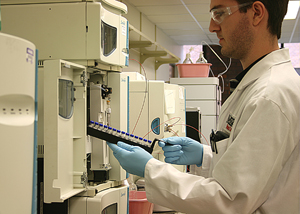 |
Courtney Fletcher, Pharm.D. |
When the disease first came to light in the 1980s, Dr. Fletcher, armed with his pharmacology expertise, joined other researchers on the figurative ground floor of HIV/AIDS research.
“When we started, the best you could do for a patient was extend life about six months on average,” said Dr. Fletcher, who is now dean of the UNMC College of Pharmacy. “Now we can think of HIV as a chronic disease — take your drugs and you can live a fairly normal life.”
This is so thanks in large part to the work of Dr. Fletcher, who remains a preeminent force in HIV/AIDS drug research despite his full-time job as UNMC pharmacy dean.
Dr. Fletcher begins work with HIV/AIDS
Dr. Fletcher’s path toward HIV/AIDS research was not intentional. As a researcher at the University of Minnesota in the early 1980s, he studied drugs to treat cytomegalovirus (CMV) infection — a type of herpes virus that is common and lethal in patients with weakened immune systems.
At the time, Dr. Fletcher and others interested in CMV focused more on transplant patients. But CMV became a major concern as HIV/AIDS came on the scene because the weakened immune system of those with HIV/AIDS made them vulnerable to the ravages of CMV.
As time went on, Dr. Fletcher and his colleagues began to help develop drugs to treat CMV disease in HIV/AIDS patients.
|
|
“Our involvement with HIV/AIDS drug research really was born out of proximity,” Dr. Fletcher said. “We already were working on the drugs for treatment of one viral infection, CMV, so it was pretty natural for us to work on other drugs to this new viral infection, HIV.”
Proper dosages: a delicate balance
As a pharmacology expert, Dr. Fletcher focuses on how drugs and patients interact.
To set proper dosages, Dr. Fletcher and his team monitor blood levels in HIV/AIDS patients to see if drug levels are high enough to effectively fight the virus and low enough to not harm the patient.
Once they get enough data collected that shows a certain dose meets these requirements, they submit their information to the Food and Drug Administration (FDA) to approve the suggested dose.
 |
John Weinhold, research technologist,analyzes drug concentrations in blood samples using a mass spectrometer in Dr. Fletcher’s lab. |
Mark Kline, M.D., is professor of pediatrics and chief of retrovirology at Baylor College of Medicine. He also runs a network of HIV/AIDS clinics for children that treat more than 30,000 patients in Africa and Romania. He has worked with Dr. Fletcher since the early 1990s and said the importance of Dr. Fletcher’s work in the development of HIV/AIDS drugs cannot be overstated.
Work benefits children worldwide
In the early part of this decade, thanks to the pharmacology work of Dr. Fletcher and his team, the FDA approved the use of the drug efavirenz for children at nearly the same time it was approved for use in
adults.
Efavirenz — which inhibits the growth and replication of HIV/AIDS — is one of the most common and effective drugs used to treat the disease.
The speedy approval for use in children is nearly unheard of as drugs are typically approved for use in adults years before they are in children. This is so because proper dosages for children are hard to set because they are growing and their systems still developing.
Dr. Fletcher’s team was at it again last year as their pharmacology work helped another effective drug — atazanavir — receive FDA approval for use in children.
Like efaverinz, atazanavir inhibits the virus’s growth and replication.
|
“Finding the right dose for a child is not as simple as just giving a child a smaller dose based on body weight,” Dr. Fletcher said. “In simple terms, finding the right dose for a child requires adjusting for a moving target.”
But Dr. Fletcher’s team was able to work through these issues and likely saved countless lives, Dr. Kline said.
“It’s fair to say there isn’t a child receiving HIV treatment today that hasn’t benefited from what Courtney has done,” Dr. Kline said.